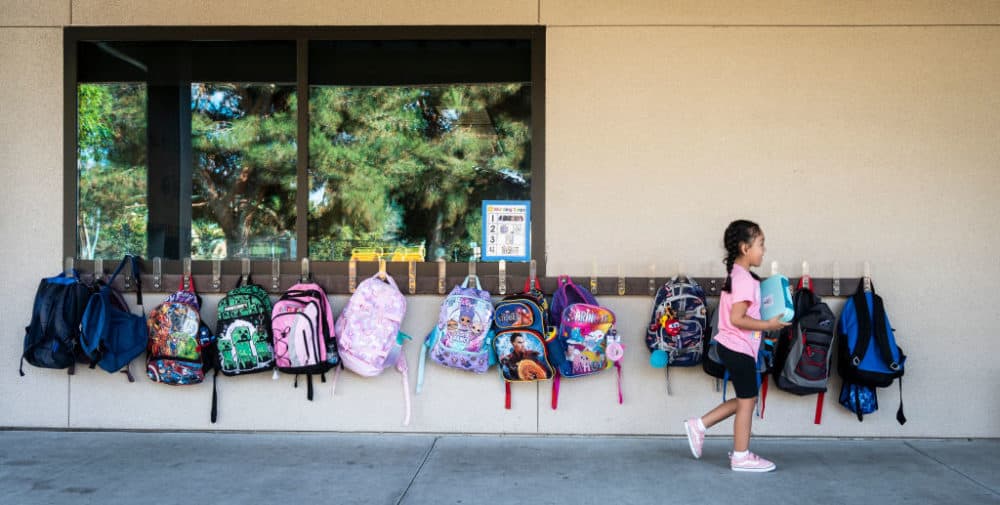Advertisement
Commentary
Mass. students are struggling. Three big ideas our next governor must pursue

COVID upended many aspects of American life, but the impacts of the crisis have been profound on our nation’s learners. Students in Massachusetts at every level, as their peers across the country, have suffered from school and college closures, limited social interactions and the loss of many milestone events. Helping our students recover and thrive must be a priority of our next governor.
Since serving in state government, I have continued to focus my professional work on the need for excellence in our education system. I’ve worked as an investor in edtech companies, as an advisor to STEM companies and as the CEO of an innovative language learning company. Most recently, I’ve led a Massachusetts nonprofit that supports school and district leaders who made it their mission to provide high-quality learning — regardless of delivery mode — during the pandemic. And this summer, I began efforts to transform our family’s farm into an education and rescue center to provide more opportunities for students in the Berkshires.
In all of my work I have been guided by a simple premise: What would I want for my own three daughters, and what academic preparation will enable them to live purposeful, successful and meaningful lives?
Now is the time to pursue transformational progress toward building a system of lifelong learning that will ensure that Massachusetts education system continues to be the envy of the country and the world.
At the end of the summer, we got one indicator of how far we have to go: Children in our nation’s public schools lost two decades of progress math and reading.
Predictably, the blame game followed. Was it the Republicans or the Democrats who shut down schools? It’s the fault of the teachers’ unions! We can't use technology in the classroom ever again!
In late September, Massachusetts released state results that will have parents in the Bay State on high alert: Recovery from the pandemic years, is at best, uneven. While Massachusetts has traditionally topped the national rankings, I see states around the country taking bolder action to combat the challenges facing our children. Massachusetts’ next governor needs to take up this charge.
Student resilience ought not be stopped by academic recalcitrance.
First, to get back to basics, and especially to help our kids read at grade-level, we need to ensure that teachers use evidence-based instructional strategies to teach reading. For too long we’ve allowed the wild west in our schools of education. How kids are taught to read in one town could be totally different from the town next door. Recently, Colorado, took the critical step of requiring every post-secondary school of education to prove they were teaching evidence based instructional strategies to the next generation of teachers — or those schools will lose their state certification. Massachusetts should follow suit. This is a bold move, at a critical moment, to implement what we know works.
The aging of our teacher workforce has been a looming issue for years. We are now seeing significant retirements come to pass. While we need strategies to attract more teachers, we also need to make sure that those new teachers receive training that research show make them effective instructors of reading.
Second, for every current student not reading at grade level, the next governor should require an individual remediation plan — Virginia just launched a plan with an even more expansive requirement. Massachusetts should require its plan to be compromised of proven effective strategies, and like Virginia, require parental sign off similar to an individualized education plan (IEP). With the massive investments we’ve made in technology, and the availability of federal dollars flowing steadily through 2024, getting high-dosage tutoring, pinpointing specific areas of weakness through formative assessments and targeting those areas of weakness with remedial instruction can be available to all struggling students.
Back in 2001 when I was governor, the first class of students required to pass the MCAS was facing unacceptably high failure rates. I instituted a similar “Student Success Plan” requirement. Sure, the initial reaction from the field was resistance. But focusing on what each student needs is what this moment calls for from our educators and leaders.
Our next governor and legislature can’t stop with K-12 reforms. Our higher education system needs attention, too. Our new governor should guarantee that every student, including transfer students, who enroll in one of our state college or universities can graduate with a bachelor’s degree in four years. What often prevents this from happening is a lack of available required courses at a time, and in a sequence, needed to stay on track. This is greatly exacerbated if a student hits a bump in the road, as nearly all students do. Yet, with the ubiquity of high-quality and accredited online courses, including two distinct offerings from UMass, as well as the prevalence of in-person summer classes, it is ridiculous to imagine that there does not exist a path that includes a little pivoting and rewards resilience.
The next governor should not be deciding on transfer credits, but she or he must direct their higher education board to require every president to guarantee a four-year pathway. Student resilience ought not be stopped by academic recalcitrance.
Massachusetts and every state faces significant education challenges that have been exacerbated by the pandemic. Yet, crises often present opportunities for transformation and innovation that aren’t possible in normal times. Therefore, as a commonwealth let’s not spend time assigning blame — there is plenty to go around.
We have unprecedented access to federal and state funds. Our next governor has plenty of opportunity to make education a priority and to make sure every learner is well served.
